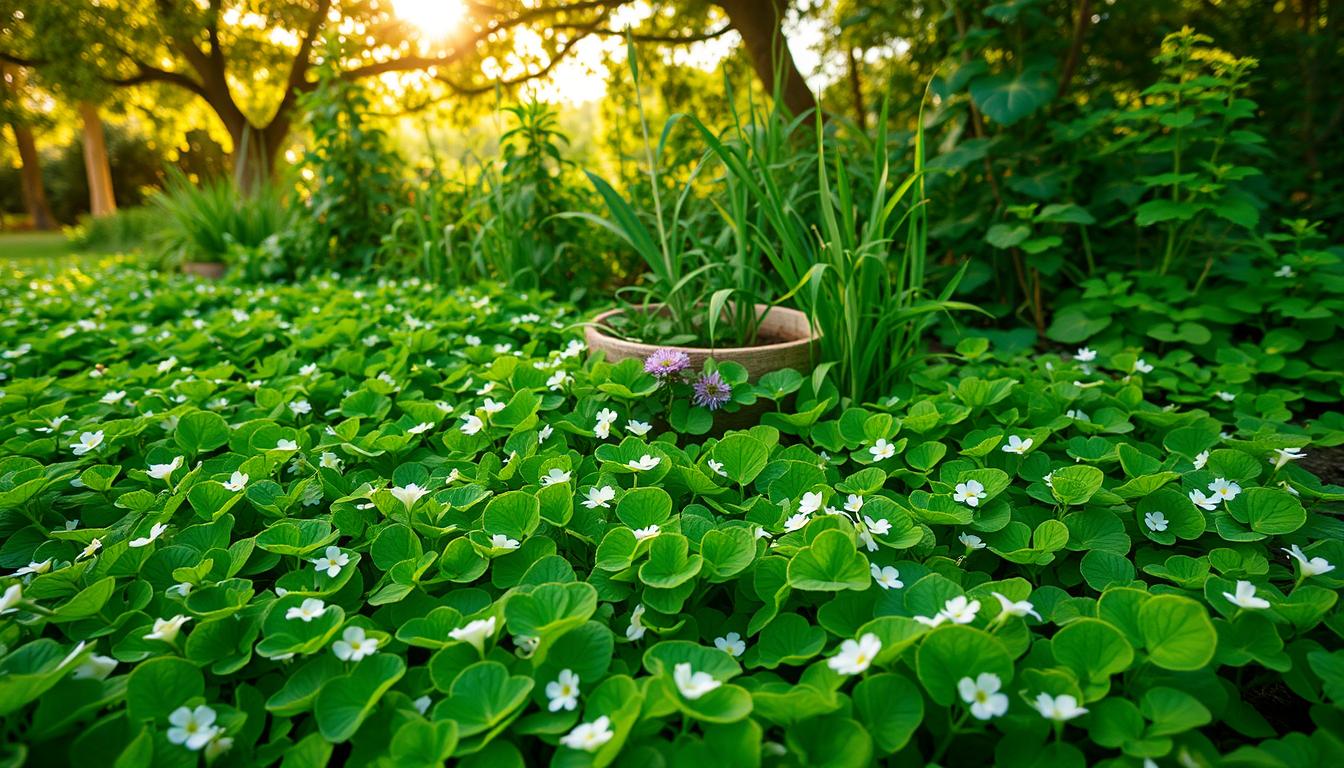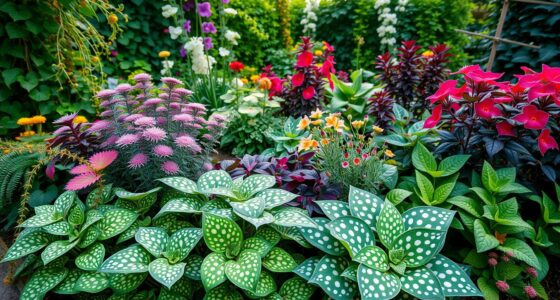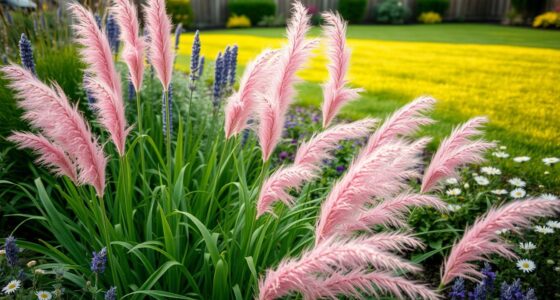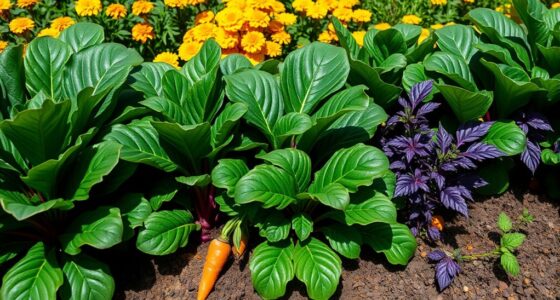Have you ever noticed the small patches of clover in your lawn, dismissing them as nothing more than weeds? It’s time to change that perspective. When you embrace the beauty of clover as a companion plant, you’ll unlock a garden’s true potential. As you begin your gardening journey, the clover companion plant benefits become undeniable—whether you introduce them to enrich your soil, attract beneficial insects, or support the growth of nearby vegetation. Just think of it: a thriving garden that supports both the environment and your culinary delights. As spring rolls in, let’s explore how this underappreciated gem can transform your plots and enhance your gardening experience.
Key Takeaways
- Clover can be a powerful companion plant to enhance your garden.
- It offers numerous benefits, including improved soil fertility.
- Utilizing clover helps attract helpful insects to your garden.
- Clover varieties thrive in diverse climates and poor soil.
- This versatile plant can act as a cover crop or green manure.
What is Clover and Why Use It?
Clover is a versatile leguminous plant with multiple varieties that serve unique purposes in gardening. Using a clover companion plant can greatly enhance your garden’s productivity and health. Each type of clover has distinct benefits, making them ideal partners for a variety of crops. Understanding these varieties will help you select the best clover plant companions to maximize the benefits of clover companion planting.
Overview of Clover Varieties
Different clover types offer various advantages. Below are some notable clover varieties and their characteristics:
| Clover Variety | Description | Key Benefits |
|---|---|---|
| Red Clover | Often used in livestock feed, this clover features vibrant pink flowers. | Mild aggressiveness, improves soil nitrogen levels. |
| Dutch White Clover | This hardy variety excels in suppressing weeds and maintaining ground cover. | Effective in preventing soil erosion, excellent drought tolerance. |
| Crimson Clover | Alegant with striking red flowers, ideal for tiling into soil. | Enhances soil fertility, aesthetically pleasing. |
Benefits of Clover as a Cover Crop
Implementing clover in your gardening strategy offers numerous advantages. As a cover crop, clover contributes remarkably to soil health. It fixes nitrogen, which is crucial for plant growth. Furthermore, clover improves soil structure, promoting better water retention and aeration. The benefits of clover companion planting extend beyond soil health. Clover can attract beneficial organisms and prevent weed growth, helping maintain an ideal garden ecosystem.
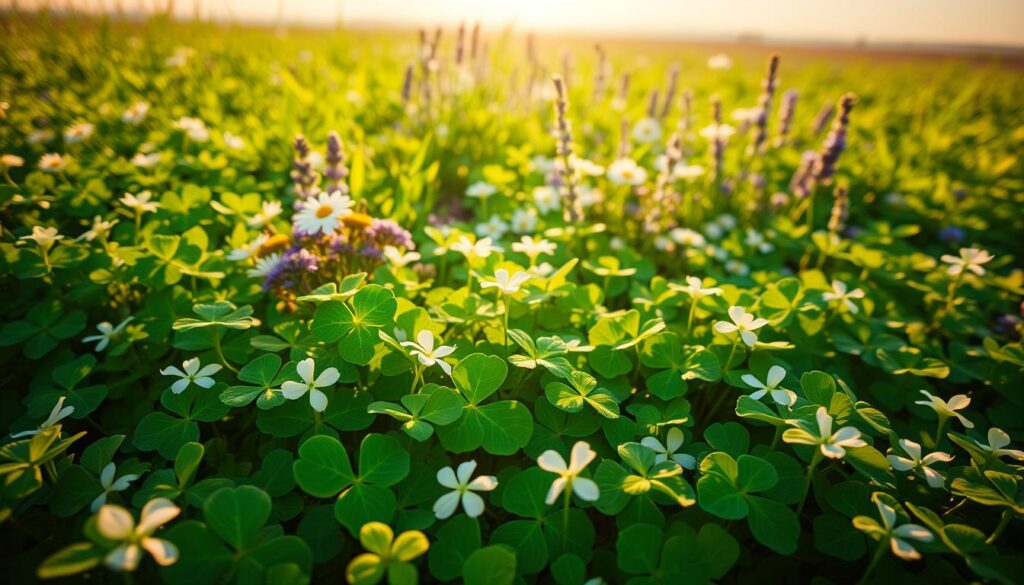
Enhancing Soil Health with Clover
Clover serves as a remarkable clover companion plant, providing numerous benefits that enhance soil health. By incorporating clover into your gardening practices, you can take advantage of its natural abilities to enrich the soil and create a better environment for future crops. Understanding its roles in nitrogen fixation and soil structure improvement will guide you in making the most of this versatile plant.
Nitrogen Fixation Explained
Clover plays a crucial role in nitrogen fixation, a process where it extracts nitrogen from the atmosphere and converts it into a form that plants can use. This transformation occurs through the symbiotic relationship between clover roots and nitrogen-fixing bacteria. As a result, soil becomes enriched, significantly benefiting crops that require nitrogen during their growth. This aspect of clover companion planting is essential for maintaining a healthy garden ecosystem.
Improving Soil Structure
Another important aspect of clover is its ability to improve soil structure. The root system of clover not only helps prevent erosion but also promotes water retention within the soil. A well-structured soil retains moisture, allowing plants to thrive even during dry spells. Utilizing clover as a companion plant contributes to a sustainable garden by ensuring that your soil remains fertile and resilient.
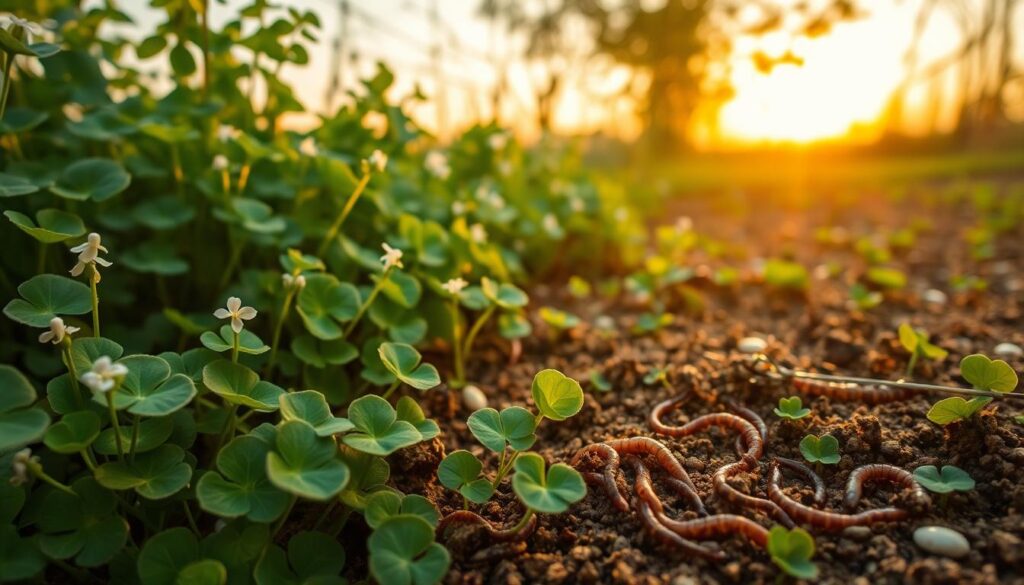
In summary, understanding the clover companion plant benefits—such as nitrogen fixation and improved soil structure—can significantly enhance your gardening practices. Referencing a clover companion planting guide can help you implement these strategies effectively, paving the way for a healthier garden and thriving crops.
The Best Clover Types for Companion Planting
Clover offers a variety of options that can enhance your garden through strategic companion planting. Selecting the right clover type plays a crucial role in benefiting both your plants and soil. Below are some of the best companion plants for clover that you can consider for a vibrant and healthy garden.
White Clover: A Versatile Choice
White clover is renowned for its adaptability, thriving in different soil conditions. This clover variety not only enriches soil but also provides excellent ground cover, diminishing weed competition and promoting biodiversity. It’s an ideal addition to various landscapes, making it a prime choice in clover plant companion selection.
Red Clover: Attracting Pollinators
Red clover is known for its striking blooms that attract essential pollinators like bees and butterflies. By incorporating red clover in your garden, you enhance not just the aesthetic appeal but also increase pollination, leading to better yields in surrounding crops. Utilizing red clover can be a significant strategy in your clover companion planting tips.
Micro Clover: Ideal for Small Spaces
If you’re limited on space, micro clover is a perfect solution. This low-growing variety maintains all the benefits of traditional clover while occupying less vertical space. Its dense root system adds structure to the soil, making it an excellent choice for compact gardens. Micro clover proves that even small areas can benefit from effective clover plant companion selection.
| Clover Type | Benefits | Best Companions |
|---|---|---|
| White Clover | Soil enrichment, ground cover | Vegetables, fruit trees |
| Red Clover | Attracts pollinators, improves yield | Fruit-bearing plants, herbs |
| Micro Clover | Dense root system, space-efficient | Small vegetables, ornamental plants |
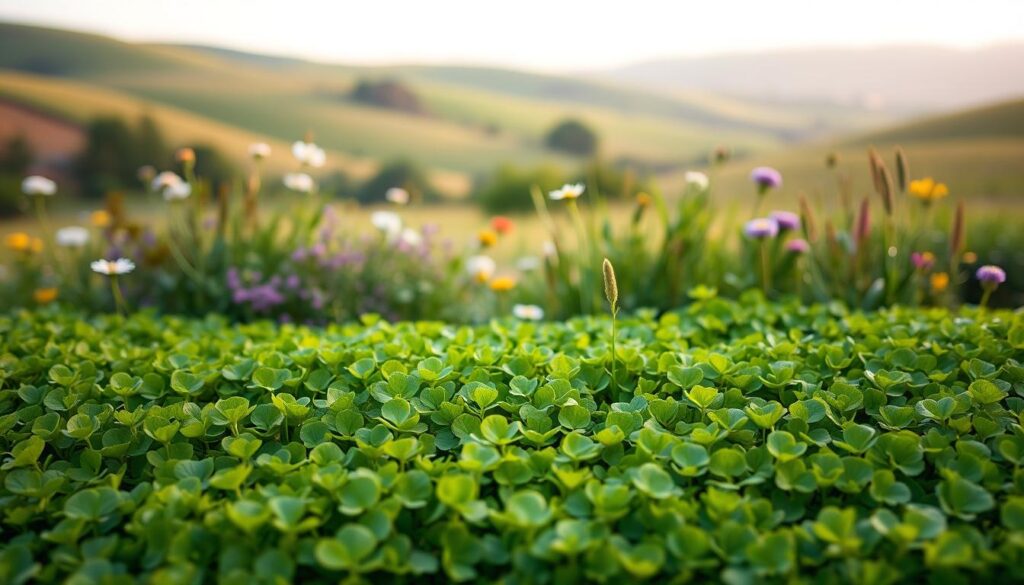
Companion Planting Basics
Companion planting serves as a fascinating strategy in gardening, emphasizing relationships between different plant varieties. Selecting a clover companion plant can boost your garden’s productivity by enhancing growth and offering support to neighboring plants. This clover companion planting guide explores how these connections can transform your gardening experience.
Understanding Plant Relationships
Every plant interacts uniquely with others, leading to beneficial or detrimental effects. For instance, clover enriches the soil with nitrogen, improving the health of adjacent crops. This is one of the vital aspects of companion planting that gardeners often rely on. Through fostering healthy plant partnerships, you can create a thriving ecosystem in your garden.
Benefits of Companion Planting
The advantages of clover companion planting include various ecological and practical benefits. Utilizing clover alongside other plants can result in:
- Improved pest control through natural repellence and attracting beneficial insects.
- Enhanced growth rates due to nitrogen fixation from clover.
- Reduced weed competition, making maintenance easier for you.
Integrating companion planting into your garden plan maximizes space and resources, contributing to a healthier, more productive environment.
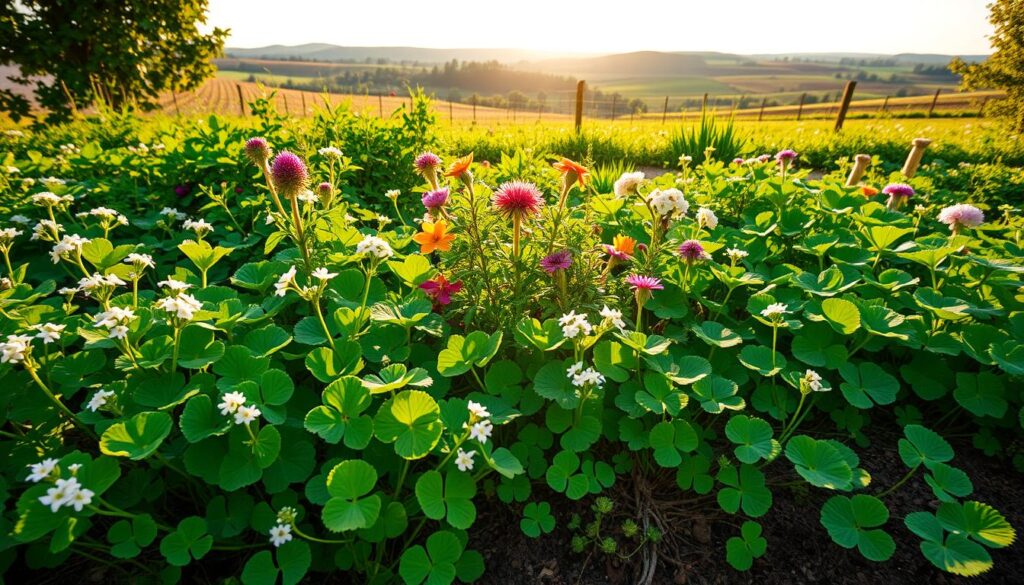
Clover and Vegetable Gardening Synergy
Clover serves as an excellent companion plant for various vegetables, making it a valuable addition to your garden. Its unique characteristics not only promote growth for your chosen crops but also help in managing weeds effectively. Understanding the ideal clover plant companions can enhance your garden’s productivity significantly.
Top Vegetables to Plant with Clover
Several vegetables thrive when grown alongside clover. Consider planting:
- Tomatoes
- Cucumbers
- Peppers
- Lettuce
- Carrots
These plants benefit from clover’s ability to improve soil structure and nutrient availability, creating a vibrant ecosystem that encourages healthy growth.
How Clover Reduces Weeds
Clover acts as an effective ground cover, which aids in suppressing weeds by blocking sunlight and competing for resources. This natural defense allows your vegetable crops to flourish without the stress of unwanted weeds. Embracing clover companion planting tips can lead to a more organized and productive garden, helping you achieve success in your gardening endeavors.
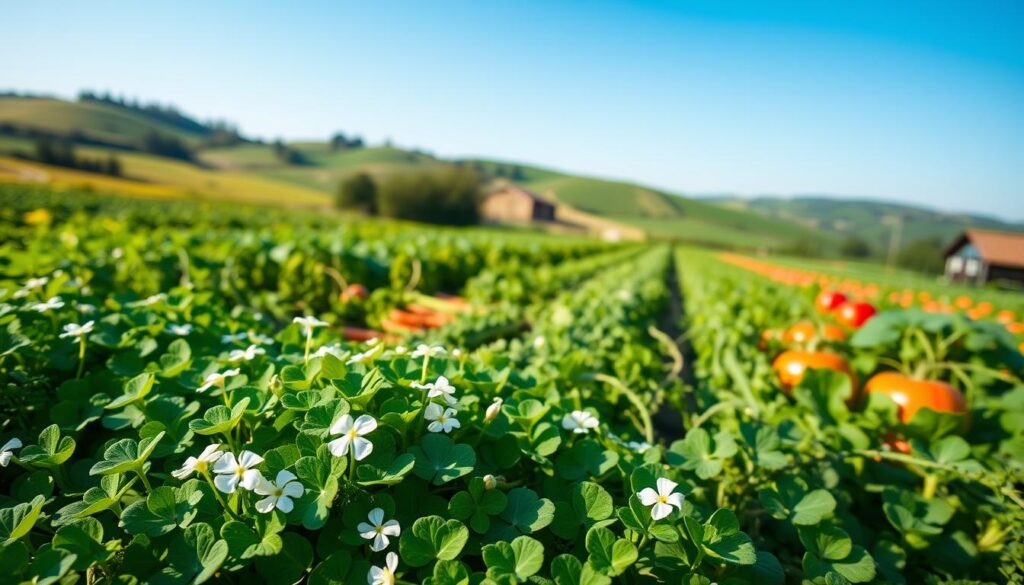
Attracting Beneficial Insects
Clover is not just a lush green addition to your garden; it serves as an important companion plant that attracts beneficial insects. By incorporating clover into your landscape, you can nurture a thriving ecosystem conducive to health and productivity.
Clover’s Role in Pollinator Habitats
You can maximize the joys of gardening by utilizing clover as a companion plant. The flowers of clover provide rich sources of nectar that attract vital pollinators such as bees and butterflies. These insects play a crucial role in ensuring successful fruit and vegetable production. A clover companion planting guide can help you understand how to effectively position clover to enhance the presence of these pollinators in your garden.
Supporting Natural Pest Control with Clover
In addition to attracting pollinators, clover also fosters habitats for predatory insects like ladybugs and lacewings. These helpful species keep harmful pest populations under control, leading to fewer pesticide needs. Understanding the clover companion plant benefits can deepen your appreciation for this versatile ground cover. By integrating clover into your gardening strategy, you create a vibrant, balanced environment in which both plants and insects thrive.
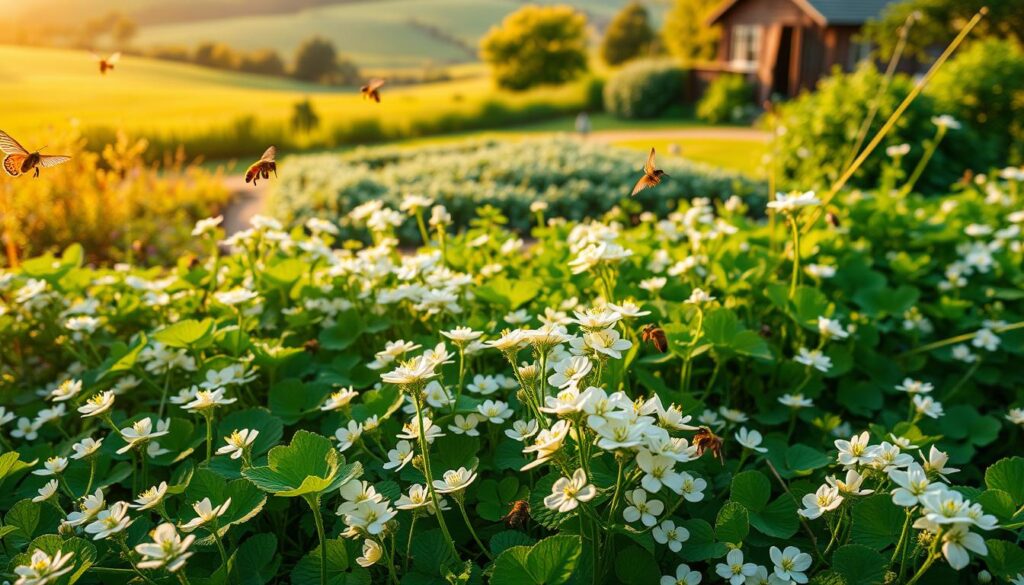
Managing Clover in Your Garden
Effectively managing clover as a companion plant enhances both your garden’s productivity and overall health. To reap the benefits of clover, you should implement best practices for growth and consistently monitor its development. Careful management ensures that this resilient plant does not overshadow your primary crops while still providing essential nutrients and protection.
Best Practices for Clover Growth
To maximize the advantages of your clover companion plant, consider these clover companion planting tips:
- Choose the right clover variety based on your garden’s needs and climate.
- Plant clover at the correct depth for optimal germination and growth.
- Water regularly, especially during dry spells, to encourage robust development.
- Incorporate organic fertilizers to boost soil nutrients and support clover health.
When to Mow or Trim Clover
Mowing your clover is vital to maintaining its structure and health. The best time to mow clover is before it begins to flower, which helps prevent it from going to seed and potentially overrunning your garden. Regular trimming promotes healthier growth and integration with your other plants. Following these clover plant companion selection strategies allows you to enjoy the multiple benefits clover offers while keeping your garden organized and thriving.
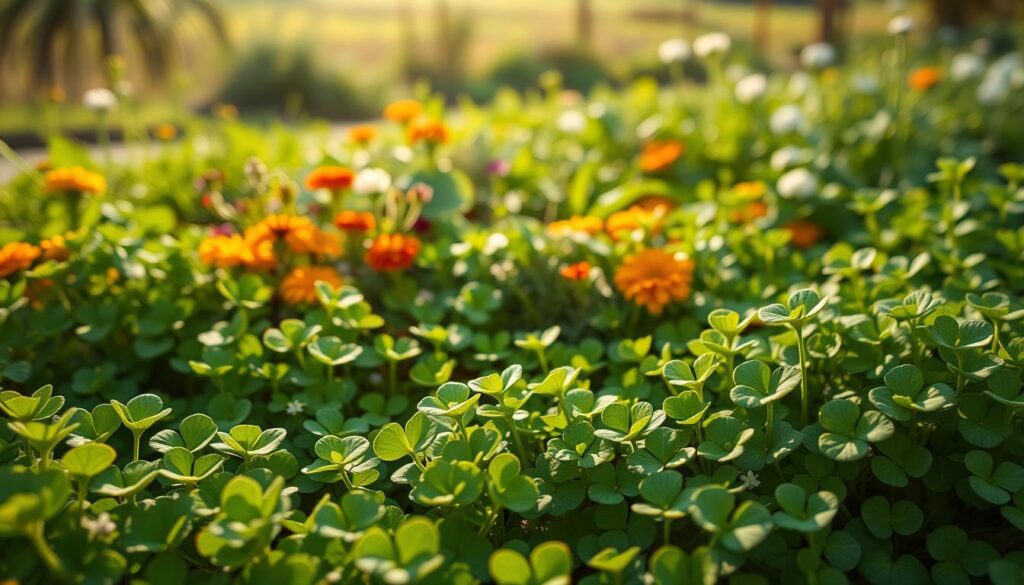
Clover’s Seasonal Benefits
Understanding the seasonal benefits of using clover as a companion plant can significantly enhance your gardening experience. By implementing a clover companion planting guide, you can optimize the health of your garden throughout the year. This approach not only improves soil quality but also supports sustainable practices.
Spring Planting for Early Growth
Spring planting of clover offers the chance for early growth as temperatures rise. As clover establishes, it promotes nitrogen fixation, enriching the soil for your other plants. This allows you to maximize the benefits of clover companion planting by creating a thriving environment for various crops.
Fall Cover Crop Advantages
Using clover as a fall cover crop provides essential protection for the soil during winter. It prevents erosion and suppresses weed growth while creating a natural mulching effect. Embracing these fall benefits ensures your garden remains healthy and productive, setting the stage for more successful planting in the coming seasons.
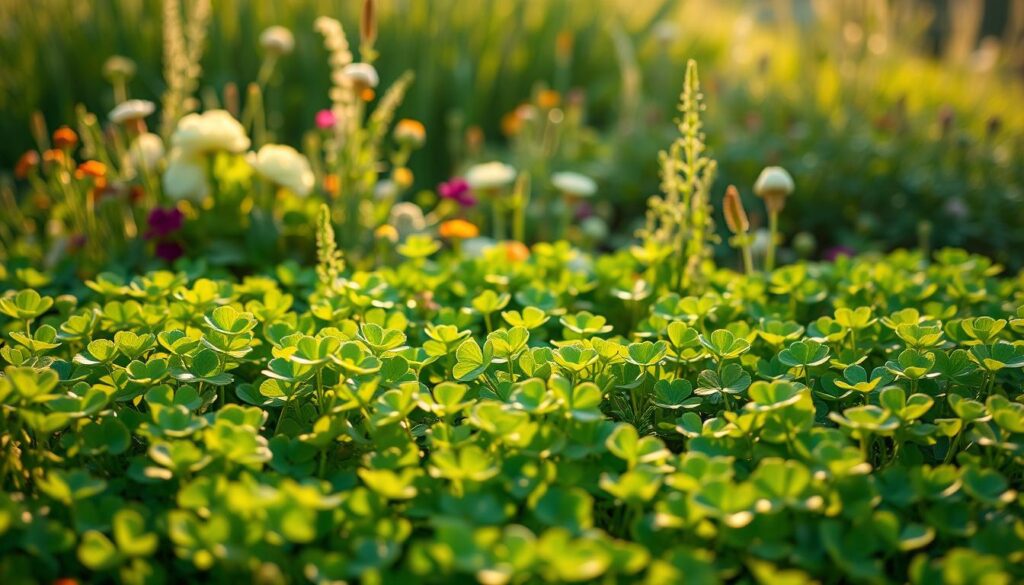
Common Mistakes to Avoid
When incorporating clover as a companion plant, being aware of potential pitfalls enhances your gardening experience. Understanding common mistakes to avoid with clover can significantly improve growth and promote a flourishing garden ecosystem. Here are a few key considerations to keep in mind during your clover companion planting journey.
Overwatering Considerations
One prevalent mistake among gardeners is overwatering their clover plants. Excessive moisture can lead to root rot, significantly hindering plant development. It is essential to maintain appropriate soil moisture levels, allowing the roots to breathe while preventing drowning. Monitoring rainfall and soil condition will guide your watering schedule, ensuring that your clover thrives instead of flounders.
Choosing the Wrong Clover Variety
Selecting an inappropriate clover variety for your specific garden conditions can result in disappointing outcomes. Some clovers may compete aggressively with your desired plants, leading to poor growth or failure to thrive. Conducting thorough research on the clover varieties best suited to your climate, soil type, and intended companion plants is vital. Use clover companion planting tips to guide your selection, promoting harmony in your garden environment.
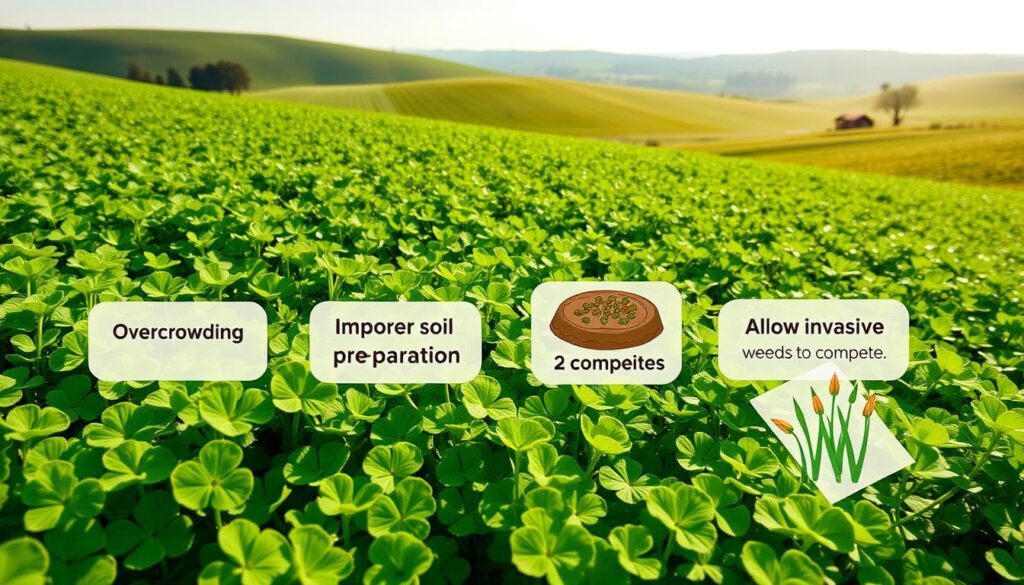
Clover and Climate Adaptability
Clover is an incredibly versatile species that can thrive in a range of climates, making it a popular choice among gardeners. The climate adaptability of clover allows it to flourish in both cooler and warmer temperatures, providing benefits as a clover companion plant across various regions. Choosing the right clover variety is essential for successful establishment and growth in your specific environment.
Growing Clover in Different Regions
Understanding your local climate conditions is critical for selecting the best companion plants for clover. Different areas may be best suited to specific varieties. For instance, Dutch Clover thrives in moderate climates due to its resilience, while other types may perform better in harsher conditions. Here’s a quick overview of suitable clover varieties for various climates:
| Climate Type | Recommended Clover Varieties | Key Characteristics |
|---|---|---|
| Cool Temperatures | White Clover, Micro Clover | Cold-tolerant, establishes quickly |
| Moderate Temperatures | Dutch Clover | Resilient and adaptable to moisture |
| Warm Temperatures | Red Clover | Thrives in heat, attracts pollinators |
Climate Considerations for Success
For gardening success with clover, consider how local weather patterns, soil types, and other environmental factors impact growth. The climate adaptability of clover enables it to suit diverse soils, but proper management must be employed. Regular monitoring of moisture levels and soil health will help in maximizing the clover’s potential as a companion plant. With care and attention, you can take full advantage of what clover offers in your garden.
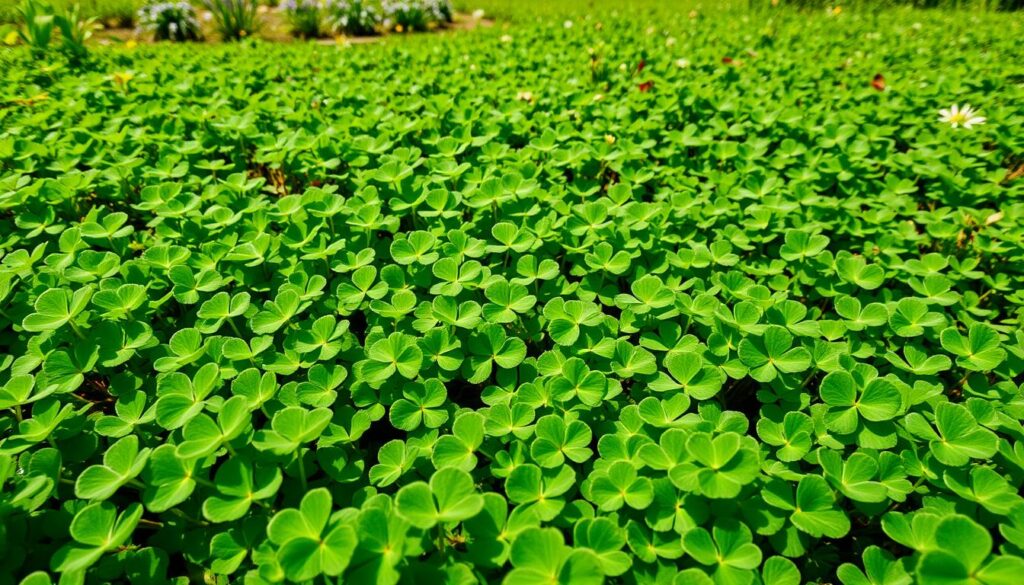
Harvesting and Utilizing Clover
Clover serves not only as a fantastic clover companion plant but also offers various uses that enrich your gardening experience. Understanding how to properly harvest and utilize this versatile plant can add flavors to your meals and improve soil health.
Edible Uses of Clover
The flowers and leaves of clover are entirely edible and can be enjoyed in a variety of ways. You might consider tossing fresh clover leaves into salads for a fun twist or using the flowers to infuse teas with a delightful hint of sweetness. This aspect is a highlight to note in your clover companion planting guide, as it adds a multi-functional quality to your gardening efforts. Experimenting with clover plant companions can offer not only aesthetic benefits but also delicious additions to your diet.
Using Clover as Green Manure
Growing clover specifically as green manure can significantly enhance your garden’s soil structure and nutrient levels. When tilled under, clover enriches the soil, preparing it for the next planting cycle. This practice maximizes the benefits of your clover companion plant by utilizing its natural abilities to fix nitrogen and improve overall soil health. Emphasizing clover in your garden strategy can lead to more fruitful growing seasons ahead.
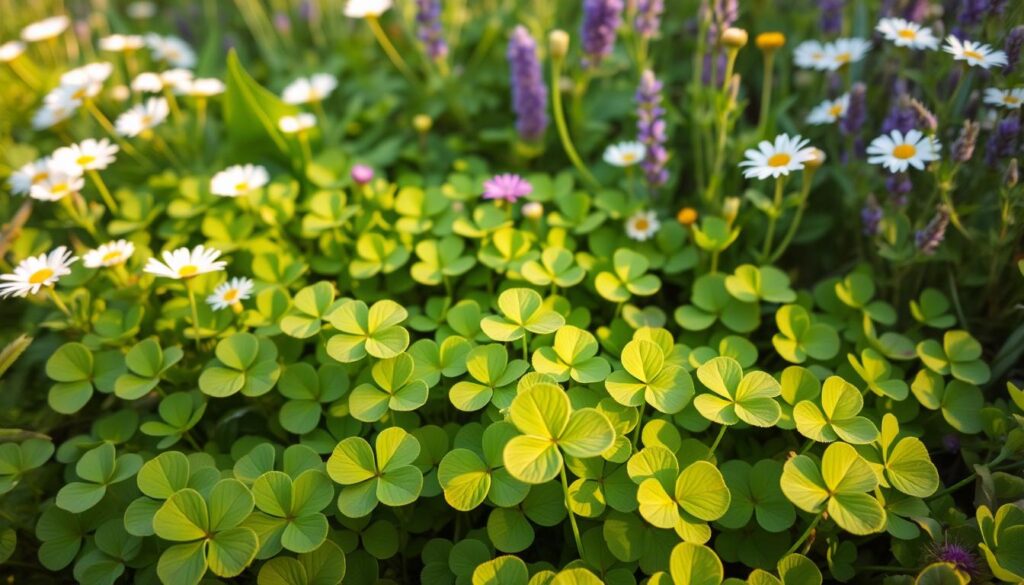
Long-Term Benefits of Clover in the Garden
Clover serves as an exceptional companion plant, offering numerous advantages that contribute to the long-term health of your garden. One of the most notable benefits is its ability to maintain soil fertility over time. By fixing nitrogen in the soil, clover minimizes nutrient depletion, making it an ideal choice for growers seeking sustainable gardening practices.
Sustaining Soil Fertility
Using clover in your garden can lead to improved soil health. This leguminous plant enhances nitrogen levels, which in turn fosters the growth of other plants. As a clover companion plant, it not only enriches the soil but ensures that surrounding flora thrives. You can enjoy better yields and healthier plants through consistent use of clover.
Building Biodiversity in Your Yard
Incorporating clover into your gardening plans plays a significant role in building biodiversity with clover. This plant attracts various beneficial insects, such as pollinators and pest control agents, creating a balanced ecosystem. By promoting diverse biological interactions, you support overall garden health and resilience. The clover companion plant benefits extend beyond mere aesthetics, fostering an environment rich in life.
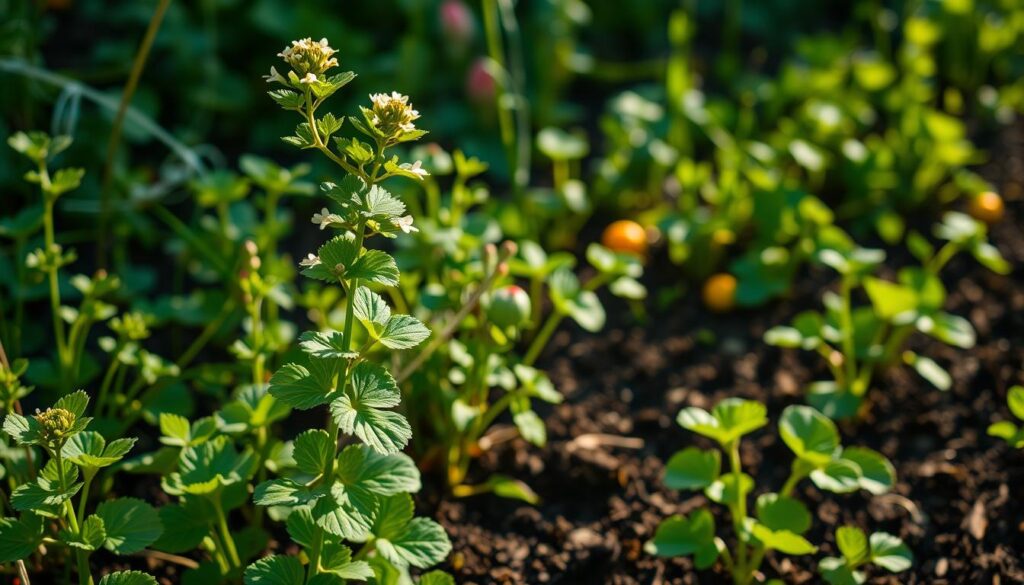
Conclusion: The Power of Clover in Your Garden
As you wrap up your exploration of the clover companion plant, it’s evident that its role in enhancing your garden cannot be overstated. By incorporating clover into your planting strategies, you’ll tap into numerous benefits of clover companion planting, such as superior soil quality, improved pest management, and enhanced plant relationships. These advantages make clover an essential player in your gardening success.
Summary of Key Benefits
The multifaceted benefits of clover include nitrogen fixation, which enriches the soil and supports healthier plant growth. Additionally, clover’s ability to suppress weeds and attract beneficial insects further bolsters the health and productivity of your garden. With the right clover companion planting guide, you can create a thriving ecosystem that fosters biodiversity and maximizes your harvest potential.
Encouraging Experimentation with Clover
Dare to experiment with various types of clover to discover their unique companion relationships in your garden. Whether you choose white, red, or micro clover, embracing this journey can lead to exciting gardening breakthroughs. The more you explore, the better prepared you’ll be to enjoy a flourishing garden that thrives with the natural benefits of clover companion planting.
